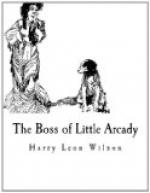And yet I doubt if Solon Denney ever suspected me of aspiring to be his rival. She, I think, knew it full well, in the way her sex knows matters not communicated by act or word of mouth. And once, on the afternoon of that day, a Friday, when we spoke pieces, I feared that Solon had found me out. He was a fiery orator, and I felt on this occasion that he delivered himself straight at me, with a very poorly veiled malignance. Surely, it must be I that he meant, literally, when he thundered out, “Sir, you are much mistaken if you think your talents have been as great as your life has been reprehensible!” Fall upon me and upon me alone seemed to flash his gaze.
“After a rank and clamorous opposition you became—all of a sudden—silent; you were silent for seven years; you were silent on the greatest questions—and you were silent for money!”
There could be no doubt, I thought, that he singled me from the multitude of his auditors. It was I who had supported the unparalleled profusion and jobbing of Lord Harcourt’s scandalous ministry; I who had manufactured stage thunder against Mr. Eden for his anti-American principles—“You, sir, whom it pleases to chant a hymn to the immortal Hampden—you, sir, approved of the tyranny exercised against America, and you, sir, voted four thousand Irish troops to cut the throats of the Americans.”
Under the burden of this imputed ignominy, was it remarkable that I faltered in my own piece immediately following?
“The Warrior bowed his crested head,
and tamed his heart of fire,
And sued the haughty King to free his
long imprisoned sire.”
Not more foully was the blameless Don Sancho done to death than I upon this Friday murdered the ballad that recounts his fate. And she, who had hung breathless on Solon’s denunciations of me, whispered chattily with Eva McIntyre during my rendition of “Bernardo del Carpio.”
Later events, however, convinced me that I swam never in Solon’s ken as a rival for her smiles. His own triumph was too easy, too widely heralded. In the second week of her coming, was there not a rhyme shouted on the playground, full in the hearing of both?
“First the post and then the
gate,
Solon Denney and Lucy Tait.”
Was not this followed by one more subtle, more pointed, more ribald?
“Solon’s mad and I’m glad, and I know what will please him; a bottle of wine to make him shine and Lucy Tait to tease him!”
I thought there was an inhuman, devilish deftness in the rhymes. The mighty mechanism of English verse had been employed to proclaim my remoteness from my love.
And yet the gods were once graciously good to me. One wondrous evening before hope died utterly I survived the ordeal of walking home with her from church.




